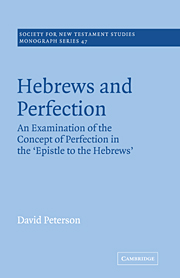Book contents
- Frontmatter
- Contents
- Preface
- Abbreviations
- 1 The Hermeneutical Issues
- 2 The Linguistic Background
- 3 The Perfecting of Christ: The Broad Perspective
- 4 The Perfecting of Christ: His Earthly Struggle
- 5 The Perfecting of Christ: His Exaltation
- 6 The Perfecting of Believers
- 7 Perfection and the Purpose of Hebrews
- Appendix A The Sinlessness of Christ and his Perfecting
- Appendix B When Did Jesus 'Become' High Priest?
- Notes
- Bibliography
- Index of Passages Quoted
1 - The Hermeneutical Issues
Published online by Cambridge University Press: 28 October 2009
- Frontmatter
- Contents
- Preface
- Abbreviations
- 1 The Hermeneutical Issues
- 2 The Linguistic Background
- 3 The Perfecting of Christ: The Broad Perspective
- 4 The Perfecting of Christ: His Earthly Struggle
- 5 The Perfecting of Christ: His Exaltation
- 6 The Perfecting of Believers
- 7 Perfection and the Purpose of Hebrews
- Appendix A The Sinlessness of Christ and his Perfecting
- Appendix B When Did Jesus 'Become' High Priest?
- Notes
- Bibliography
- Index of Passages Quoted
Summary
The justification for a full-scale study of the concept of perfection in the so-called ‘Epistle to the Hebrews’ could simply be given in the words of Otto Michel: ‘understanding Christian perfection is important, indeed central, for an interpretation of the Epistle to the Hebrews’. The centrality of the concept to the writer's theology has been clearly recognised by those commentators who have provided extended notes on the subject and by the various authors of journal articles who have attempted to investigate the idea more closely. Three times in Hebrews the perfecting of Christ is mentioned (2: 10; 5: 9; 7: 28). On four occasions we are told that the Old Covenant ritual was unable to perfect the worshippers (7: 11,19; 9: 9; 10: 1). On three specific occasions we are told that Christ alone is the source of perfection for believers (10: 14; 11: 40; 12: 23), though the use of related terminology elsewhere in the argument proclaims the same truth. Additionally, the writer urges his readers to ‘maturity’ (5:11 –6:1) and points them to Christ as the ‘perfecter’ of faith (12: 2). An interpretation of these themes and their inter-relationship is clearly important for a proper understanding of Hebrews.
However, the multiplicity of opinions as to the background and purpose of this document is reflected in the variety of interpretations that have been offered to explain the concept of perfection it sets forward.
- Type
- Chapter
- Information
- Hebrews and PerfectionAn Examination of the Concept of Perfection in the Epistle to the Hebrews, pp. 1 - 20Publisher: Cambridge University PressPrint publication year: 1982



